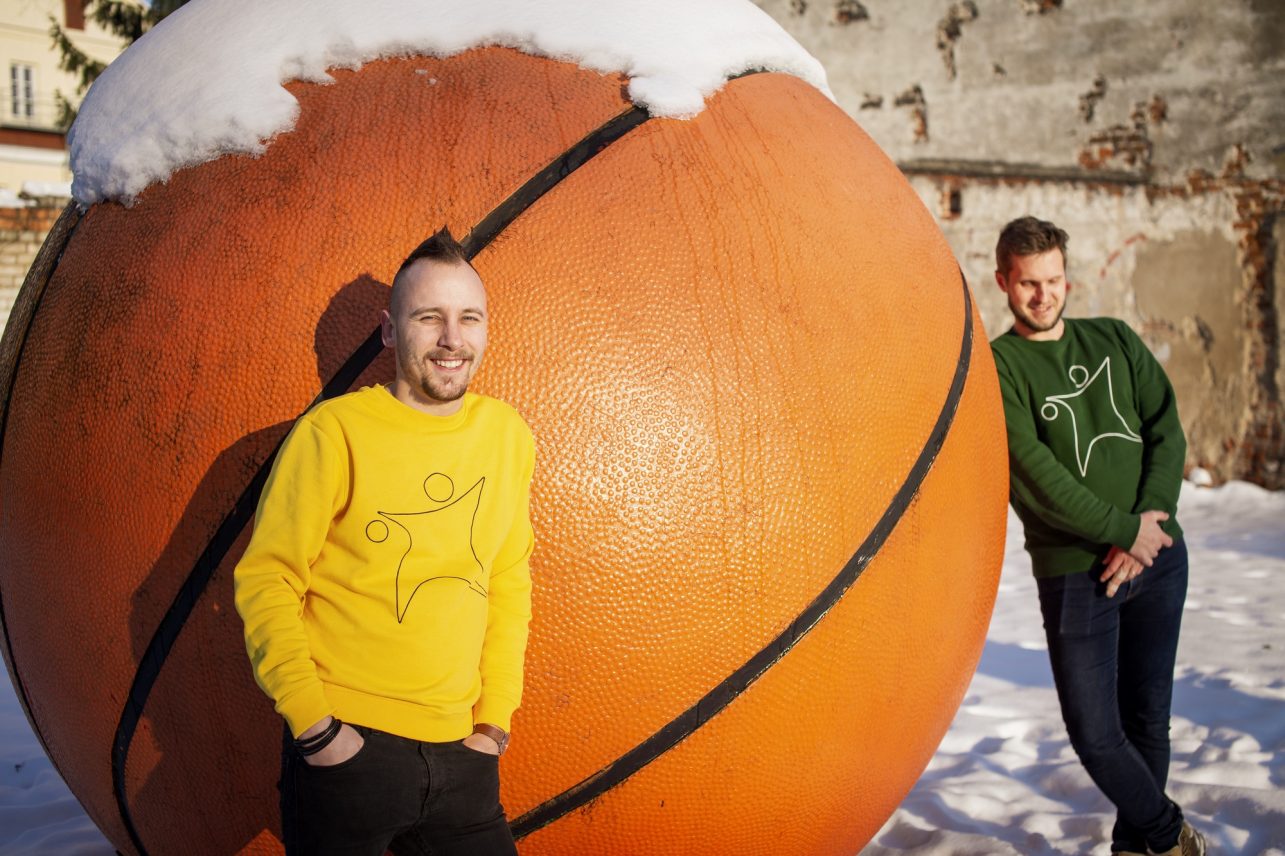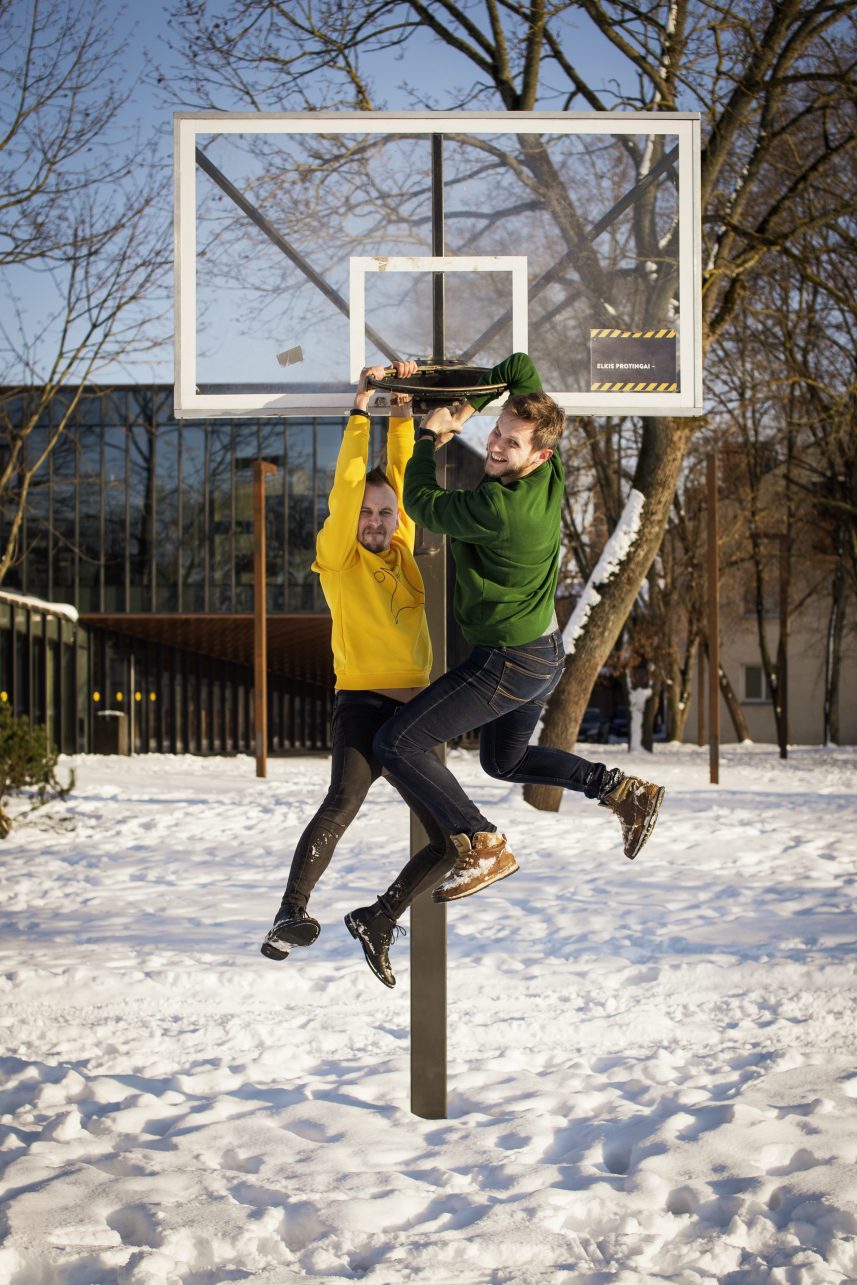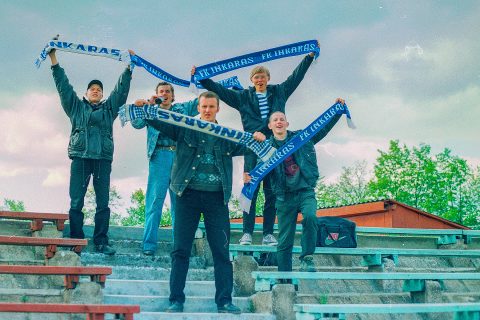One of the two basketball media giants can be found in a strategic location: next to Žalgiris Arena (with a fast-food restaurant nearby) and really close to the House of Basketball. And the word “giant” is not used here ironically.

Their podcasts that come out twice per week are listened to by tens of thousands of people, and they have over two thousand sponsors on Patreon. The news appears on their website very swiftly, 17 people collaborate on this project, they maintain contacts with teams, and travel to all the basketball hotspots in the world… Well, let’s face it, cultural journalism is still quite far from such audiences in Lithuania (as well as abroad). But sharing experiences with colleagues is always fun. And the occasion is March 10: Basketnews turns sixteen. We talked about the never-stopping basketball train with the project’s editor-in-chief Jonas Miklovas and Karolis Tiškevičius, who prefers to be called a commentator rather than a journalist.
Jonas, have you been in this project from the very beginning?
Jonas: Yes, I have! I was 19 back then. The project was founded by my friends and I joined it as a journalist. Over time, I became one of the shareholders.
Where did the nineteen-year-old got his journalistic experience from?
Jonas: I started around 2003, when my parents bought me a computer and set up the internet. My brother and I created a website nba.dar.lt and we had around 50 readers. I have no idea how they were finding us and how they liked the texts translated from English by teenagers that were uploaded the next day after an NBA match. At the time, mIRC chat client software was very popular and on it, we found other people who also had a website and then, others and so on. Then Eurobasket.lt and then Basketnews.lt were born. So, I could say that my school consisted of reading with mouth agape, as Americans say. For example, there was this legend, Mark Stein, who worked for ESPN and now works for the New York Times and in 2019 we were colleagues at the world championship! I went up to him, shook his hand, and said something. I also noticed that I wasn’t the only one so seriously starstruck.
Karolis, how did you end up here?
Karolis: Jonas and I have known each other since the beginning of my career. I worked at Žalgiris Radio around 2009, so we were seeing each other at press conferences, saying hi. After a couple of seasons on the radio and several projects during championships, he invited me to Basketnews to create a radio show about basketball. First, it was broadcast on Radio Tau and later on Extra FM. After some time, the collaboration seized, and I returned a couple of years ago, only with a different format. As a basketball podcast, we were the second in Lithuania. Donatas Urbonas from 15min.lt was the first. We have talked about how short-sighted we were at the time. We could have used this format from the very beginning.
Do you collaborate or rather compete with colleagues from other specialized websites and major media?
Karolis: We are all friends, but also competitors. Like basketball players, they shake hands before a match but want to cut each other’s throats during it. We pay attention to views: who does better, what gets the most comments, who makes the most noise, and who reports faster.
There are some great crime reporters, for example, who have been describing for decades where and what exploded and who hit what. But they don’t live in it, they are not crazy about it in a sense of a hobby. But I do see similarities between sports and cultural journalists, we even do the same things after work. Do you ever feel tired of basketball?
Jonas: Karolis keeps asking me why I don’t follow the Lithuanian Basketball League (which he comments on). It’s because don’t want to do that anymore!
Karolis: He doesn’t watch Lithuanian Basketball League, but mostly talks about it on his podcast. Today, for example, we started talking about our top five lists and he began adding players to his list, even though he doesn’t know how good they currently are.
Do teams have their favorite journalists?
Karolis: Žalgiris doesn’t like me… Maybe because of my remarks. Let’s not forget that I, as a Kaunas resident and former part of Žalgiris, have even worked with Lietuvos Rytas. But I am not interested in just talking nicely, it’s fun to troll sometimes and intentionally go against the popular opinion. It’s much more fun for both me and the audience.
It’s interesting that you’ve worked both in clubs and as an independent journalist. What is more fun – to support one side in public and get paid for it, or to be neutral but free?
Karolis: In general, I’d say I am more of a commentator. And about that duality… Lithuania is a wonderful country in the sense that you can work in the club, in the media, and in the league all at once. I’ve had all three cases at once, and really, a lot of colleagues are trying to balance the two. This probably does not mean that we lack specialists, but rather that nobody really cares. It is too small a country for this to be a problem.
Jonas: I haven’t worked in a club, but we, as Basketnews, provide communication services to several Lithuanian Basketball League and National Basketball League teams; we work with national and women’s leagues. But this is already being done by other employees, not me personally. I now limit myself to podcasts and trips with Žalgiris, where I interview the players. I have a lot of managerial work and it consumes a lot of time.
And you published a book! Anyone who hasn’t yet read I Am A Miracle, Haven’t you Noticed? about the Romanovas’ period in Žalgiris, should definitely do it. Did you receive threats after it was published? After all, it revealed so many spicy details.
Jonas: I did not receive any letters, only a couple of months later the man who brought me together with Vladimiras Romanovas, reappeared. He wanted to get several copies. I signed them and took them to him so that he could also send a copy to Vladimiras in Moscow. He told me, “I will let you know what he said since he would not be straight with you, but with me, he will.” A month later, he calls me and says, “Well, I talked to Vova, all is good, don’t stress about it. There were a couple of things he didn’t like, but only a couple.”
Karolis: But there are some who got offended.
Jonas: Yes, there are people who said that it wasn’t how things happened.
Hence, it had caused a stir. Did sales reflect that? And will there be a second book?
Jonas: The publishing house initially printed 2,000 copies. In Lithuania, this is the number of a bestseller. The book was sold out before the second edition, which was 5000 copies this time. However, last year, before the holidays, the copies were sold out again, although everyone buys books for Christmas. Then another 2,000 were released, so a total of 9,000. And there are thoughts for the second book, but I’ve pushed them aside for now. But at some point, I will have to do it, I don’t want to be a one-hit wonder.

So, let’s move to the podcast. You generate an incredible amount of content in one week: four, five shows about the Euroleague, the NBA, answering people’s questions. And when I say you, I mean many different people.
Jonas: I right away thought that it had to be a much broader project than just a Basketnews show. First, when there was no clear plan as to how things would go, Karolis did the podcast with a colleague Vytautas Mikaitis that he invited. The first person they interviewed was Žalgiris player Artūras Milaknis. I, along with the coach Tomas Keršis, joined it later and after us, projects Užkalti halės langai (Boarded up windows of Sports Hall) with Rytis Vyšniausias in the front and Karolis Kadikinas representing the perspective of an ordinary fan, and ENBAS headed by Rokas Jama Grajauskas – a person with the best understanding of NBA in Lithuania – and his colleague Mykolas Jankaitis came about. And so, we all talk under the same label of Basketnews.
Last spring, unlike during the second quarantine, no sports competitions took place. Was it then that you started enriching your empty schedule with podcasts?
Jonas: Of course. When things stopped, we were the first to start doing something. Colleagues just closed, left the studios, everyone was gone for a month. And we’ve come up with new themes via Zoom, from home.
Karolis: We were also the last ones to leave the studio last spring. Like those musicians on Titanic, we believed until the last minute that we might not be drowning. By the way, I turned off the light.
How many views do you get after a good Žalgiris’ victory, to which you usually respond overnight in a podcast format?
Jonas: The video format gets about 20-25 thousand views. Audio around 3000. And, of course, we try to respond as fast as possible. The news gets old, and the earlier you upload a show, the more views you will get. That is what we compete for. We do shows even on Sundays because others do it on Mondays!
Do the interviewees often ask you to cut something out or delete from the shows?
Karolis: It happens. Gediminas Žiemelis (who recently acquired an arena and is establishing a basketball club in Vilnius, ed.) was one of them. He wrote to me, “Oh, maybe we shouldn’t mention that? Perhaps we shouldn’t put that in?” Finally, I put everything in and thought to myself – whatever happens, happens. But it went well, and I think they also achieved their goals if they had any. But these cases are rare. A podcast is an interesting genre precisely because you rarely cut out the things you or your interviewee say.
Jonas, you mentioned that you work with women’s basketball communication. How do you assess the audience prospects of this sport? Because so far in Lithuania it is in the shadows.
Jonas: Women’s basketball around the world in the shadows. As for the NBA, for example, they wear pink WNBA sweaters in their competition bubble in an attempt to promote women’s basketball. But they have issues there as well, starting with the pay gap, which is huge.
But we have the case of Justė Jocytė. This fifteen-year-old caused quite a stir.
Jonas: Well, yes, she played in Lithuania for a bit and then went to France two months later because she got a contract with Asvel. These two months were the highlight of the Lithuanian Women’s Basketball League. And now again no one is interested. But this is also the case in other sports, men are viewed more.
Why?
Karolis: When trying to be extremely politically correct and fair, we often avoid saying what is obvious. Men score higher and possibilities are higher. The viewer observes a higher level of sports. Of course, women’s sports also have intrigue, it is beautiful, different, but at the same time it is on a different physical level. That is why women do not compete with men.
Jonas: By the way, when it comes to the viewer and the podcast, we see who listens to it and that is, 96 percent men. Although on the website, the ratio is 80/20.
And what is the most read article in Basketnews?
Jonas: On the death of Kobe Bryant last January.
Maybe we should brighten up the mood. Do you know how to play basketball?
Karolis: We think we do.




